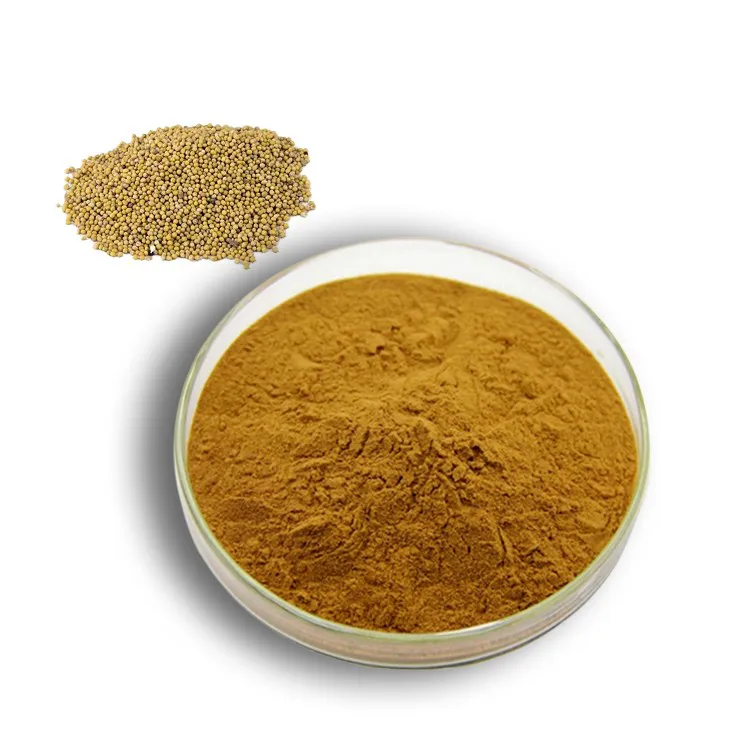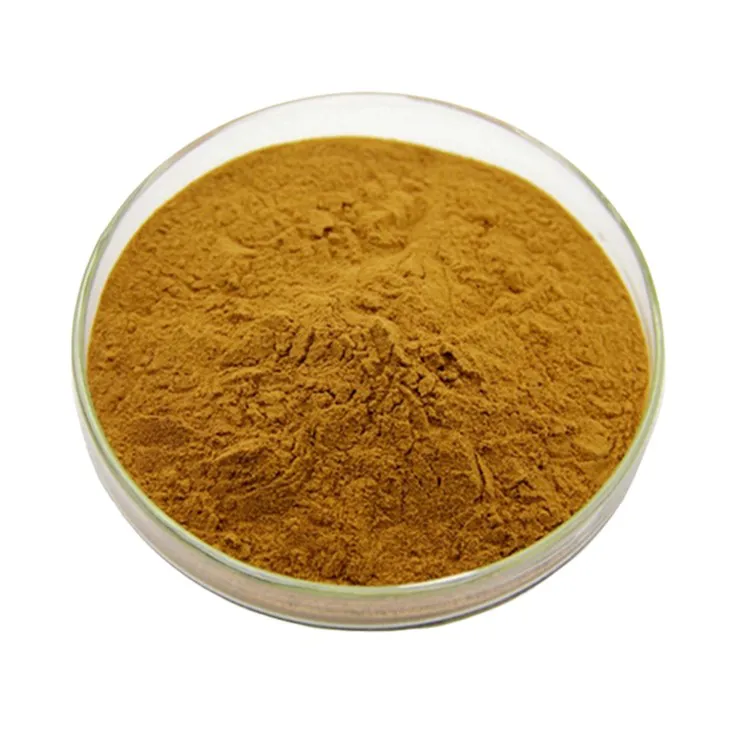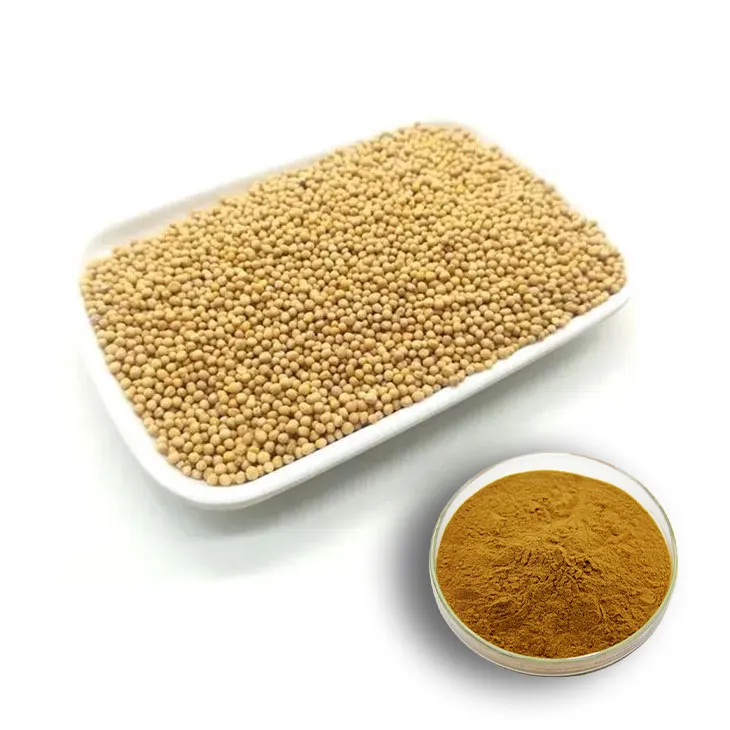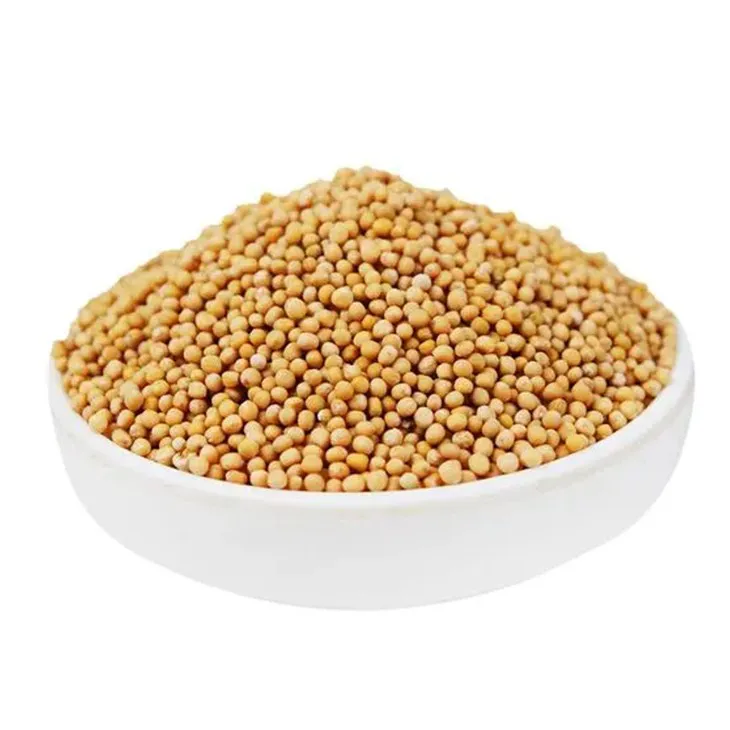- 0086-571-85302990
- sales@greenskybio.com
Shaping the Future: Trends and Innovations in the White Mustard Seed Extract Industry.
2024-12-19

1. Introduction
The White mustard seed extract industry is currently at a crucial juncture, standing on the brink of significant transformation. This extract, derived from white mustard seeds (Sinapis alba), has been known for its various properties for centuries. However, in recent years, it has gained newfound attention due to emerging trends in different sectors. This article will explore these trends, including the increasing demand in the pharmaceutical and cosmetic sectors, as well as innovative processes such as advanced extraction techniques, and analyze how they are molding the future of the White mustard seed extract industry.

2. The Growing Demand in the Pharmaceutical Sector
2.1 Medicinal Properties
White mustard seed extract contains several bioactive compounds that are of great interest to the pharmaceutical industry. Glucosinolates, for example, are a group of sulfur - containing compounds that have been associated with various health benefits. These compounds have shown anticancer potential, as they can be broken down into isothiocyanates, which have the ability to induce apoptosis (programmed cell death) in cancer cells. Additionally, white mustard seed extract has been studied for its anti - inflammatory properties. Inflammation is a key factor in many chronic diseases, such as arthritis, and the anti - inflammatory components in the extract may offer new treatment options.
2.2 Drug Development
Pharmaceutical companies are increasingly looking at white mustard seed extract as a potential source for new drugs. The complex mixture of compounds in the extract provides a rich pool of molecules for screening and drug discovery. Researchers are using advanced techniques such as high - throughput screening to identify specific compounds in the extract that can be developed into drugs. This trend is likely to continue as the understanding of the pharmacological properties of white mustard seed extract deepens.
2.3 Nutraceuticals
The concept of nutraceuticals, which combines the benefits of nutrition and pharmaceuticals, is also driving the demand for white mustard seed extract. As consumers become more health - conscious, they are seeking natural products that can provide both preventive and therapeutic benefits. White mustard seed extract, with its array of bioactive compounds, fits well into this category. It can be formulated into dietary supplements, such as capsules or powders, and marketed as a natural alternative to synthetic drugs for certain health conditions.

3. The Rising Popularity in the Cosmetic Sector
3.1 Skin Benefits
White mustard seed extract has several properties that make it attractive for use in cosmetics. It has been found to have moisturizing effects on the skin. The extract can help to improve the skin's barrier function, preventing moisture loss and keeping the skin hydrated. Moreover, it has antioxidant properties, which are crucial for protecting the skin from free - radical damage. Free radicals are unstable molecules that can cause premature aging, wrinkles, and other skin problems. By neutralizing these free radicals, white mustard seed extract can contribute to maintaining healthy and youthful - looking skin.
3.2 Hair Care
In the area of hair care, white mustard seed extract is also finding applications. It can be used to promote hair growth by stimulating the hair follicles. The nutrients in the extract, such as proteins and vitamins, can nourish the hair, making it stronger and less prone to breakage. Additionally, it can help to control dandruff, as its anti - fungal properties can combat the yeast that is often associated with dandruff.
3.3 Product Formulations
The extract is being incorporated into a wide range of cosmetic products. From creams and lotions to shampoos and conditioners, white mustard seed extract is becoming a popular ingredient. Cosmetic manufacturers are constantly looking for new and natural ingredients to differentiate their products in the highly competitive market. The unique properties of white mustard seed extract offer an opportunity to create innovative and effective cosmetic formulations.

4. Innovative Extraction Techniques
4.1 Supercritical Fluid Extraction
One of the most innovative extraction techniques being applied to white mustard seed extract is supercritical fluid extraction. This method uses a supercritical fluid, usually carbon dioxide, as the solvent. Supercritical carbon dioxide has properties that are intermediate between a gas and a liquid, allowing it to penetrate the plant material effectively and extract the desired compounds. This technique has several advantages over traditional extraction methods. It is a greener alternative, as carbon dioxide is non - toxic and can be easily removed from the extract, leaving no harmful residues. It also offers high selectivity, meaning that it can target specific compounds in the white mustard seeds, resulting in a purer extract.
4.2 Microwave - Assisted Extraction
Microwave - assisted extraction is another emerging technique in the white mustard seed extract industry. This method uses microwaves to heat the solvent and the plant material simultaneously, which speeds up the extraction process. By applying microwaves, the cell walls of the white mustard seeds are disrupted more quickly, allowing the release of the target compounds. This technique is not only faster but also more energy - efficient compared to traditional extraction methods. It can also reduce the amount of solvent required, which is beneficial both from an environmental and a cost - perspective.
4.3 Enzyme - Assisted Extraction
Enzyme - assisted extraction is based on the use of specific enzymes to break down the cell walls of white mustard seeds. These enzymes can be selected to target the components of the cell walls that are difficult to break down by traditional methods. By using enzymes, the extraction process can be made more efficient, and the yield of the desired compounds can be increased. This technique also has the potential to produce a more bioactive and stable extract, as the enzymes can help to preserve the integrity of the bioactive compounds during extraction.

5. Challenges and Opportunities
5.1 Quality Control
As the demand for white mustard seed extract grows, ensuring quality control becomes a significant challenge. The composition of the extract can vary depending on factors such as the origin of the seeds, the extraction method, and the storage conditions. To meet the standards of the pharmaceutical and cosmetic industries, strict quality control measures need to be implemented. This includes the analysis of the chemical composition of the extract, the detection of contaminants, and the verification of the bioactivity of the compounds. Quality control laboratories need to be equipped with advanced analytical instruments, such as high - performance liquid chromatography (HPLC) and gas chromatography - mass spectrometry (GC - MS), to accurately analyze the extract.
5.2 Regulatory Compliance
The white mustard seed extract industry also faces regulatory challenges. Different countries have different regulations regarding the use of plant extracts in pharmaceutical and cosmetic products. For example, in the pharmaceutical sector, new drugs derived from plant extracts need to go through extensive clinical trials and regulatory approval processes. In the cosmetic sector, ingredients need to comply with safety and labeling regulations. To succeed in the international market, companies in the white mustard seed extract industry need to stay informed about the regulatory requirements in different regions and ensure compliance.
5.3 Market Competition
The increasing popularity of white mustard seed extract has led to growing competition in the market. More companies are entering the industry, which can drive innovation but also pose challenges. Companies need to find ways to differentiate their products, whether through improved extraction techniques, higher quality control, or unique product formulations. Additionally, they need to build strong brand identities and customer relationships to gain a competitive edge in the market.
6. Conclusion
The white mustard seed extract industry is indeed on the verge of significant transformation. The increasing demand in the pharmaceutical and cosmetic sectors, driven by the various properties of the extract, is a major trend that is shaping the future of the industry. At the same time, innovative extraction techniques are enabling more efficient and high - quality production of the extract. However, the industry also faces challenges such as quality control, regulatory compliance, and market competition. Companies in the white mustard seed extract industry need to be aware of these trends and challenges and take appropriate strategies to thrive in the evolving market. By doing so, they can contribute to the continued growth and development of the white mustard seed extract industry and fully realize the potential of this valuable natural resource.
FAQ:
What are the main drivers behind the increasing demand for white mustard seed extract in the pharmaceutical sector?
The increasing demand in the pharmaceutical sector for white mustard seed extract can be attributed to several factors. Firstly, white mustard seed extract has shown potential in various medicinal applications. For example, it may possess anti - inflammatory properties, which are highly sought after in the development of drugs for treating inflammatory diseases. Secondly, as research progresses, more bioactive compounds are being discovered within the extract. These compounds could be used as precursors for new drug development or as natural alternatives to synthetic drugs. Additionally, the growing trend towards natural and plant - based remedies in the pharmaceutical industry has also contributed to the increased demand for white mustard seed extract.
How do advanced extraction techniques benefit the white mustard seed extract industry?
Advanced extraction techniques offer several benefits to the white mustard seed extract industry. These techniques can improve the yield of the extract. By using more precise and efficient extraction methods, a larger amount of the desired compounds can be obtained from the same amount of mustard seeds. This is crucial for meeting the increasing market demand. Moreover, advanced extraction techniques can enhance the purity of the extract. They can target specific bioactive compounds more effectively, reducing the presence of impurities. This is important for applications in the pharmaceutical and cosmetic sectors where high - quality and pure extracts are required. Additionally, these techniques may also be more environmentally friendly, reducing waste and energy consumption during the extraction process.
What are the potential applications of white mustard seed extract in the cosmetic industry?
White mustard seed extract has several potential applications in the cosmetic industry. It may be used in skincare products due to its possible antioxidant properties. Antioxidants can help protect the skin from damage caused by free radicals, which are associated with aging and various skin problems. The extract could also have moisturizing properties, which are essential for maintaining healthy - looking skin. In haircare products, white mustard seed extract might contribute to strengthening hair follicles and promoting hair growth. Additionally, it could be used in cosmetic formulations for its potential anti - microbial properties, which can help in preventing the growth of bacteria and fungi on the skin and hair.
How is the white mustard seed extract industry adapting to meet the growing demand?
The white mustard seed extract industry is adapting in multiple ways to meet the growing demand. Firstly, companies are investing in research and development to improve extraction techniques, as mentioned earlier. This helps in increasing the production efficiency and quality of the extract. Secondly, there is a growing focus on sustainable sourcing of white mustard seeds. As the demand rises, ensuring a stable and sustainable supply of raw materials becomes crucial. This involves promoting ethical farming practices and exploring new cultivation areas. Moreover, the industry is also working on establishing better quality control standards. With more applications in the pharmaceutical and cosmetic sectors, strict quality control is necessary to meet regulatory requirements and ensure the safety and efficacy of the extract.
What challenges does the white mustard seed extract industry face in the face of emerging trends?
The white mustard seed extract industry faces several challenges in the face of emerging trends. One of the main challenges is competition from alternative ingredients. In both the pharmaceutical and cosmetic sectors, there are numerous other natural and synthetic ingredients available, and white mustard seed extract needs to prove its superiority in terms of efficacy and cost - effectiveness. Another challenge is regulatory compliance. As the extract is being used in more sensitive applications like pharmaceuticals, strict regulatory requirements need to be met. This includes ensuring the safety, quality, and proper labeling of the extract. Additionally, there may be challenges related to the scalability of production. While the demand is increasing, scaling up the production of high - quality white mustard seed extract while maintaining consistent quality can be difficult, especially when using new extraction techniques.
Related literature
- The Medicinal Properties of White Mustard Seed Extract: A Comprehensive Review"
- "Advanced Extraction Technologies in the White Mustard Seed Extract Industry"
- "White Mustard Seed Extract: Applications in Cosmetics and Skin Health"
- "Sustainable Sourcing of White Mustard Seeds for Extract Production"
- "Regulatory Challenges in the White Mustard Seed Extract Industry"
- ▶ Hesperidin
- ▶ Citrus Bioflavonoids
- ▶ Plant Extract
- ▶ lycopene
- ▶ Diosmin
- ▶ Grape seed extract
- ▶ Sea buckthorn Juice Powder
- ▶ Fruit Juice Powder
- ▶ Hops Extract
- ▶ Artichoke Extract
- ▶ Mushroom extract
- ▶ Astaxanthin
- ▶ Green Tea Extract
- ▶ Curcumin
- ▶ Horse Chestnut Extract
- ▶ Other Product
- ▶ Boswellia Serrata Extract
- ▶ Resveratrol
- ▶ Marigold Extract
- ▶ Grape Leaf Extract
- ▶ New Product
- ▶ Aminolevulinic acid
- ▶ Cranberry Extract
- ▶ Red Yeast Rice
- ▶ Red Wine Extract
-
Hesperidin
2024-12-19
-
Shikone Extract
2024-12-19
-
Carrageenan Extract Powder
2024-12-19
-
Giant Knotweed Extract
2024-12-19
-
Apricot Powder
2024-12-19
-
Shikonin
2024-12-19
-
Moringa powder
2024-12-19
-
Angelica sinensis extract
2024-12-19
-
Pueraria Lobata Extract
2024-12-19
-
Saffron Extract Powder
2024-12-19





















